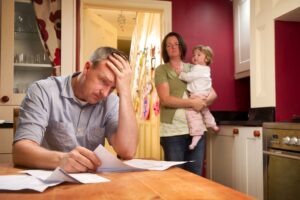Preparing for floods, fires and other natural disasters means making sure your insurances are in order – but that can be easier said than done. We spoke to financial counsellor Leonie Cooke, who leads a team of bushfire recovery specialists here at Anglicare Victoria, to get her advice on what to look out for in your policy and common traps to be aware of. Leonie has extensive experience in bushfire recovery and has been recognised by Financial Counselling Victoria for her work assisting clients in Gippsland after the Black Summer bushfires, so she had plenty of tips for us.
“Since the Black Summer bushfires people have become a bit more aware of what they may or may not have cover for, which is a good thing,” Leonie told us. “A lot of people think that talking about insurance and looking at your insurance documents is a really boring thing to do. It may not be a very exciting way to spend your weekend – but it’s so important.”
One of the first questions people ask when considering insurance is “How much cover do I need?”
When you’re trying to find the right amount of cover while also keeping your premiums affordable, it can be difficult to know just how much you need, but Leonie has some great tips that will help.
 “You can find some good calculators online on websites such as the Insurance Council of Australia. Most insurance companies also have their own calculator. These are free to use and can give you a rough guide of how much insurance cover you need,” Leonie said.
“You can find some good calculators online on websites such as the Insurance Council of Australia. Most insurance companies also have their own calculator. These are free to use and can give you a rough guide of how much insurance cover you need,” Leonie said.
“The calculator will give you an estimated figure, but it can be a good idea to add a buffer on top of that, as costs tend to go up when a disaster occurs. If several homes are damaged there will be an increased demand for supplies and tradies, and when demand goes up so do the prices,” she added.
As the cost of living continues to rise and people struggle to afford groceries and bills, insurance is often one of the first expenses they cut from the budget – but Leonie said this doesn’t have to be the case.
“My suggestion would be instead of cancelling completely, give your insurer a call. You may be able to reduce your premium by increasing your excess, for example. That way you’re still covered if disaster strikes, but you’ve eased a bit of pressure on the family budget,” she said.
Leonie said people shouldn’t feel embarrassed if they need some help understanding their insurance documents, as they can be very complicated and difficult to read if you’re not an insurance expert.
“Some of the Product Disclosure Statements (PDS) can be really hard to understand, and this confuses people,” said Leonie. “For example, people often don’t know the difference between being insured for replacement value or total sum insured. These documents can also be a bit vague about what you’re actually covered for, and it may be unclear what’s included and excluded from your policy until you try to make a claim. If you’re unsure about certain inclusions or exclusions, call your insurer and ask.”
When it comes to making a claim, Leonie said there are a few things to look out for.
“Something people often aren’t aware of is the cost of removal of debris, which can be quite expensive and needs to be done before you can start rebuilding or repairing,” said Leonie. “If your total sum insured is for $400,000, and it costs $50,000 for the removal of debris, that will come out of your total sum insured amount, meaning you’ll only have $350,000 left for the rebuilding or repairs. So, you need to think about these potential costs when you’re deciding how much you need to be covered for.”
 She also said it’s important to have those difficult conversations we’d all prefer to avoid – before disaster strikes.
She also said it’s important to have those difficult conversations we’d all prefer to avoid – before disaster strikes.
“Have a conversation with your partner or family about what your expectations are. If the worst did happen, who would put the claim in? Would you be able to find alternative accommodation? What would your priorities be?” Leonie said. “Have a proper conversation about it, because being prepared can help you feel as though you have a little more control if the worst does happen.”


